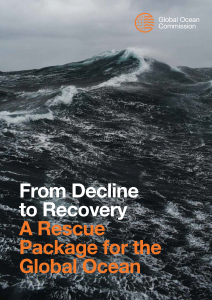 Reports written and published by major ocean organizations, by definition grey literature, may be very influential if given coverage by the press, are noticed by politicians, policy makers and marine resource managers, and offer proposals for positive action.
Reports written and published by major ocean organizations, by definition grey literature, may be very influential if given coverage by the press, are noticed by politicians, policy makers and marine resource managers, and offer proposals for positive action.
One such example is the recent report by the Global Ocean Commission (GOC) “From Decline to Recovery: A Rescue Package for the Global Ocean” (Global Ocean Commission, 2014a). In the report, the GOC states that while oceans cover nearly three-quarters of the Earth’s surface and are integral to the functioning of its ecosystems, “the ocean remains chronically undervalued, poorly managed and inadequately governed” (Global Ocean Commission, 2014b, p. 3). The report argues that the current governance model for the world’s oceans does not protect the high seas and needs to be fundamentally reconceptualised and structured.
Five “Drivers of Ocean Decline” are identified that act as serious barriers to a healthier ocean. They are: “a rising demand for resources; technological advances; decline of fish stocks; climate change, biodiversity and habitat loss; and weak high seas governance” (p. 5). By “understanding the drivers of decline individually and together, [the GOC has] come to understand that what is needed is an integrated rescue package which can deliver ocean restoration when undertaken as a whole” (p. 3).
The proposed rescue package consists of “Eight Proposals to Advance High Seas Recovery.” The eight proposals forwarded are: “UN sustainable development goal for the ocean – putting a healthy, living ocean at the heart of development; governing the high seas – promoting care and recovery; no more overfishing – ending harmful high seas subsidies; illegal, unreported and unregulated fishing – closing seas, ports and markets; plastics – keeping them out of the ocean; offshore oil and gas – establishing binding international safety standards and liability; establishing a Global Ocean Accountability Board – monitoring progress toward a healthy ocean; and creating a High Seas Regeneration Zone” (p. 5).

By World Economic Forum from Cologny, Switzerland [CC-BY-SA-2.0 (http://creativecommons.org/licenses/by-sa/2.0)], via Wikimedia Commons
Reflecting on a commercial perspective, Mr. Martin also suggested that oceans management and wellbeing are very much in the interest of industry. He stressed that “the right thing to do is in the economic interests of everyone” (our notes, June 19, 2014).
As invaluable as such ocean reports are, they will not be influential unless their main message can be effectively disseminated. The crucial role of public figures to draw attention to these reports, as shown by Mr. Martin’s excellent presentation at CZC 2014, cannot be overstated.
Canada needs to regain its former role as a leader on ocean affairs. It should be noted that the Obama administration of the United States has recently pursued a number of key initiatives toward improved ocean health, including the Ocean Action Plan that aims to “end overfishing by 2020; reduce nutrient pollution 20% by 2025; reduce carbon emissions; get at least 10% of the ocean protected by 2020” (Mission Blue/SEA Alliance, 2014). Perhaps the GOC report will move Canada in a similar direction, after careful consideration by our ocean champions and responsible government departments.
References
Global Ocean Commission. (2014a). From Decline to Recovery: A Rescue Package for the Global Ocean. Retrieved from https://s3.amazonaws.com/missionocean_www_uploads/reports/GOC+Full+Report.pdf
Global Ocean Commission. (2014b). From Decline to Recovery: A Rescue Package for the Global Ocean Report Summary. Retrieved from ttps://s3.amazonaws.com/missionocean_www_uploads/reports/GOC+Summary+Report.pdf Mission
Blue/SEA Alliance. (2014). The Tides are Changing! [electronic mailing list message]. Retrieved from http://us2.campaign-archive2.com/?u=8f84af70fe8d270b9dc5461a2&id=be1ab5d2cc&e=0e91d80502
Authors: Lee Wilson and Peter Wells